Bangabandhu Sheikh Mujibur Rahman Agricultural University
Bangabandhu Sheikh Mujibur Rahman Agricultural University (BSMRAU)[1] (Bengali: বঙ্গবন্ধু শেখ মুজিবুর রহমান কৃষি বিশ্ববিদ্যালয় (বশেমুরকৃবি)) is a public agricultural university in Bangladesh, established in 1998. It is located at South Salna, in Gazipur District. It is 9.5 kilometres (5.9 mi) from Gazipur Chowrasta, just east of the Dhaka-Mymensingh Highway.
বঙ্গবন্ধু শেখ মুজিবুর রহমান কৃষি বিশ্ববিদ্যালয় | |
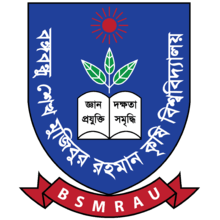 | |
Former names | Bangladesh College of Agricultural Science(1983-1991), Institute of Post-Graduate Studies in Agriculture(1991-1998) |
|---|---|
| Motto | জ্ঞান, দক্ষতা, প্রযুক্তি, সমৃদ্ধি (Bengali) |
Motto in English | Knowledge, Skill, Technology, Enrichment |
| Type | Public University |
| Established | 22 November 1998 |
| Chancellor | President Abdul Hamid |
| Vice-Chancellor | Prof. Dr. Md. Giashuddin Miah |
| Dean | Prof. Dr. Md. Abul Hossain Molla (Faculty of Graduate Studies), Professor Dr. Md. Golam Rasul (Faculty of Agriculture), Prof. Dr. Abu Sadeque Md. Selim (Faculty of Veterinary Medicine and Animal Science), Prof. Dr. A.K.M. Azad Shah (Faculty of Fisheries), Prof. Dr. M. Kamruzzaman (Faculty of Agricultural Economics and Rural Development) |
Academic staff | 198 |
Administrative staff | 370 |
| Students | ~1400 |
| Undergraduates | ~850 |
| Postgraduates | ~350 |
| ~50 | |
| Location | Gazipur , , Bangladesh 24.0362°N 90.3959°E |
| Campus | Rural,190 acres |
| Colors | • Blue Red and Green |
| Nickname | BSMRAU |
| Sports | Cricket, Football, Badminton, Handball & others |
| Website | bsmrau |

History
BSMRAU was established on 22 November 1998. Previously, it was established as Institute of Post Graduate Studies in Agriculture (IPSA). In 1983, IPSA was originally established as the Bangladesh College of Agricultural Sciences (BCAS). It was an academic part of Bangladesh Agricultural Research Institute (BARI) and associated academically with Bangladesh Agricultural University. IPSA was transformed in an autonomous institution by the government of Bangladesh and started course credit based MS and PhD programs in 1991. The graduate program of IPSA was developed by the teachers of IPSA led by L. M. Eisgruver of Oregon State University (OSU).[2]
In 1998, IPSA transformed into BSMRAU. As a public university it continued the post graduate program and launched an undergraduate program. In 2005, BSMRAU started to offer Bachelor of Science degree in Agriculture [BS (Agriculture)].
In 2008, BSMRAU established its Faculty of Fisheries and started to offer a BS degree in Fisheries. The Faculty of Veterinary Medicine and Animal Sciences was established in 2009 and started to offer the Doctor of Veterinary Medicine (DVM) degree. After 3 years, in 2012, BSMRAU established the Faculty of Agricultural Economics and Rural Development and started offering a BS in Agricultural Economics. Now, BSMRAU has five faculties.
Campus

BSMRAU is situated in Salna of Gazipur city corporation on the Dhaka-Mymensingh highway, 15 kilometres (9.3 mi) from Gazipur district headquarters, 9.5 kilometres (5.9 mi) from Joydebpur Chourasta, 5 kilometres (3.1 mi) from Security Printing Press and Ordinance Factory, and 40 kilometres (25 mi) from away from Dhaka city. The campus covers an area of 190 acres (77 ha) land including about 50 acres (20 ha) of well-developed experimental farm area. Located in a rural setting in between Joydebpur Chowrasta and National Park of Rajendrapur, surrounded by the Sal forest of the Madhupur Tract and characterized by the topographical diversity with undulated land.
The university have a regular bus service from campus to Dhaka(Farmgate) twice a day including Friday also. And campus to Joydepur in nears to 2 hours interval [3] According to BSMRAU, it offers a unique, calm and quiet campus; most suitable for academic pursuit.[4]
Infrastructure
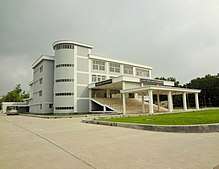


- Administrative Building
- 5 Faculty Buildings (1 under construction)
- 4 Students Dormitory (2 for Male and 2 for Female students)
- Residential Facilities for Teachers, Officers and Employees
- Kbd. Dr. Kazi M. Badruddoza Outreach Center
- Dr. M. Wazed Mia Central Laboratory
- Technology Exhibition Center
- Prof. Dr. Yoshio Yamada Library and AV Room
- Ex-situ Gene Bank/ Eco Park
- Central Mosque
- Begum Sufiya Kamal Auditorium (Accommodation of Around 1,000 seats)
- Conference Room
- Modern TSC
- Research Field
- Digital Herbarium and Herbal museum for Crop Plant[5]
- Lake View Study Park
- Cafetoria
- Canteen
- Health Centre
- International Complex
- Shaheed Minar (Monument)
- Sports Ground
- BSMRAU Sub-postoffice
- Gymnasium
- Guest House
- Sonali Bank Branch and DBBL Fast Track with ATM Booth
- BSMRAU School
- Nursery/Children Park
- BECS Supershop
- Ansar Camp
Faculty building of Agricultural Economics and Rural Development[6] and a Veterinary Clinic is in under construction. There are also some proposed infrastructures including Students dormitory, international complex etc. For these to be accomplished govt. has to allot the university more lands which are still under the authority of Forest Department.
Academics
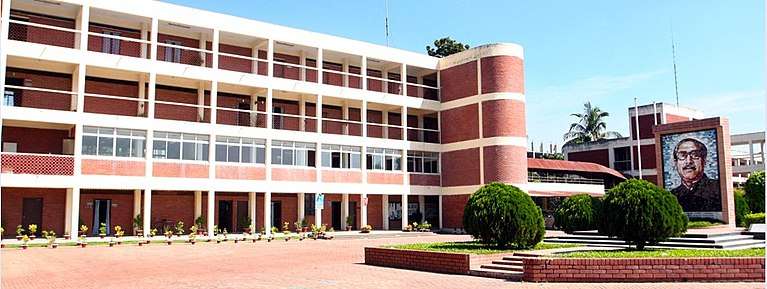
English is the medium of instruction at BSMRAU. The study at BSMRAU comprises Term based Course Credit System, which the students can understand going through the following points thoroughly:
- The Course Credit System: The course credit system involves course work with regular classes, assignments, unannounced quizzes, and pre-scheduled 2 midterms and final examinations. In this system, subject matter is taught in modules (courses) of reasonably homogenous subject matter, The students will receive “Grades” for each of the courses taken to indicate the extent of his/her mastery of the subject matter taught in each respective course.
- Term: An academic year is divided into three terms – Summer, Autumn and Winter. Each term consists of 12 (twelve) effective weeks.
- Credit: One class hour in a week during a term shall be considered as one credit. For laboratory classes, two class hours shall be considered as one credit.
- Course: A course is a set of topics delivered to the students by lectures, contact hours and practical exercises on a specific subject incorporated in the approved curricular layout and developed by Board of Studies (BOS) to offer in a term.
- Course Coding: Each course is designated by 3 (three) capital letters and a 3-digit number. The 3 letters indicate the department offering the course. Of the three digits, the first digit indicates academic year in which the course is normally offered. The next two digits indicate the offering term, where 01-30 stand for First term, 31-60 for Second term and 61-99 for Third term.
A student will have to complete a total of 54 courses of 240 credits for BS(Agriculture) degree and 69 courses of 283.5 credits for DVM degree.
Research and Publications
The university has been conducting researches from its inception shouldering active roles in national and international agricultural research arena. Teaching excellence and effective research are conclusively interrelated in academics and that of innovation in programs. Classrooms teaching are continually powered and enriched by those faculty members who are actively engaged in research. Faculty members of this university have many long and short term research projects and these projects are prepared as per national agricultural research needs and implemented. Some of the faculty members also prepare and implement research projects in collaboration with the national and international research scientists. In many cases, the postgraduate student research is linked with the research projects of the faculty members.The functions of the research management wing are to integrate the research programs undertaken by different academic departments, allocate budget, publish research abstracts, journals annual report, invite Research Management Committee (RMC) funded research project proposals, and to evaluate, implement and monitor these projects.[7] Some of the Research Journals Publishes by the University is given below:
• Annals of Bangladesh Agriculture (BSMRAU)[8]
• Bangladesh Journal of Entomology (BES/BSMRAU)
• Bangladesh Journal of Plant Breeding and Genetics (BSMRAU)
• Bangladesh Journal of Plant Pathology (BPS/BSMRAU)
Besides the University publishes An Informative Magazine about its various activities called "BSMRAU Barta".[9]
BSMRAU have developed 44 improved varieties of vegetables, cereals, pulses, fruits and flowers which are commercially cultivated by farmers throughout Bangladesh due to their high yield and nutritional potentials.[10]
Institution Ranking
As of Spain based Scimago Institutional Rankings for the Year 2020 BSMRAU Ranks 761 in the World and 6th in Overall Bangladeshi Universities and Research Institutions.[11]
Faculties and Departments

Faculty of Postgraduate Studies
Departments offering MS degree |
Departments offering PhD degree | ||
| 1. | Agricultural Economics | 1. | Agricultural Economics |
| 2. | Agricultural Extension and Rural Development | 2. | Agricultural Extension and Rural Development |
| 3. | Agroforestry and Environment | 3. | Agroforestry and Environment |
| 4. | Agricultural Engineering | 4. | Agronomy |
| 5. | Agro-Processing | 5. | Biotechnology |
| 6. | Agronomy | 6. | Crop Botany |
| 7. | Animal Science and Nutrition | 7. | Entomology |
| 8. | Aquaculture | 8. | Genetics and Plant Breeding |
| 9. | Biotechnology | 9. | Horticulture |
| 10. | Crop Botany | 10. | Plant Pathology |
| 11. | Dairy and Poultry Science | 11. | Soil Science |
| 12. | Environmental Science | 12. | Seed Science and Technology (Unit) |
| 13. | Entomology | ||
| 14. | Fisheries Biology & Aquatic Environment |
Supporting Departments | |
| 15. | Fisheries Technology | 1. | Computer Science & Information Technology |
| 16. | Fisheries Management | 2. | Statistics |
| 17. | Genetics & Fish Breeding | ||
| 18. | Gynecology, Obstetrics & Reproductive Health | ||
| 19. | Genetics and Plant Breeding | ||
| 20. | Horticulture | ||
| 21. | Pathobiology | ||
| 22. | Plant Pathology | ||
| 23. | Soil Science | ||
| 24. | Seed Science and Technology (Unit) | ||
Faculty of Agriculture
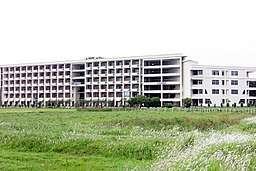
- Agricultural Extension and Rural Development
- Agroforestry and Environment
- Agronomy
- Agricultural Engineering
- Agro-processing
- Biochemistry and Molecular Biology
- Environmental Science
- Biotechnology
- Computer Science and Information Technology( CSIT )
- Crop Botany
- Entomology
- Genetics and Plant Breeding
- Horticulture
- Plant Pathology
- Soil Science
- Seed Science and Technology Unit
Faculty of Fisheries
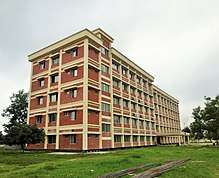
- Department of Aquaculture
- Fisheries Biology and Aquatic Environment
- Fisheries Management
- Fisheries Technology
- Genetics and Fish Breeding
Faculty of Veterinary Medicine and Animal Science

- Department of Anatomy & Histology
- Department of Animal Breeding & Genetics
- Department of Animal Science & Nutrition
- Department of Dairy & Poultry Science
- Department of Gynecology, Obstetrics & Reproductive Health
- Department of Medicine
- Department of Microbiology & Public Health
- Department of Pathobiology
- Department of Physiology & Pharmacology
- Department of Surgery & Radiology
Faculty of Agricultural Economics and Rural Development

- Department of Agricultural Economics
- Department of Agribusiness
- Department of Agricultural Finance & Cooperatives
- Department of Rural Development
- Department of Statistics
Library
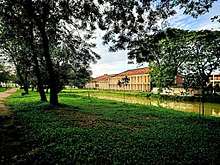
The library of BSMRAU is named as Prof. Dr. Yoshio Yamada Library. It has a separate two-storied building having 14,418 squire feet spaces. It was primarily established for postgraduate programs. However, with the inception of undergraduate programs, efforts are underway to equip the library with all necessary reference text books with multiple copies for all courses of undergraduate programs. It has a collection of around 21,800 books and more than 65,000 e-journals. The library is also regularly supplied with the journals, periodicals, bulletins, daily newspaper, magazines etc. The library is air conditioned with adequate sitting and reading facilities and an Audio-visual Room. Except on Govt. holidays,library opens at 9:00 AM and closes at 8:00 PM without any interval through Sunday to Thursday and on Saturday Library opens at 9:00 AM and closes at 5:00 PM, Friday is weekly holiday.
Students dormitories
Girls halls
- Bangamata Sheikh Fazilatunnesa Mujib Hall
- Ila Mitra Hall
Admission
Undergraduate program
Admission in undergraduate program in BSMRAU is competitive. To be eligible to apply to BS (Agriculture), BS (Fisheries), BS (Agricultural Economics) and DVM program in both the SSC(Secondary School Certificate) / equivalence and HSC(Higher Secondary School Certificate) / equivalence examinations, Candidate must have to acquire at least GPA of 3.00 in each and at least 7.00 in total excluding the fourth subject. In the case of GCE 0 Level and A Level Passed candidates, there should be a minimum B grade in 5 subjects in 0 level examination and a minimum B grade in each of the Physics, Chemistry, Mathematics and Biology subjects in A level examination. Note that in the case of 0 level and A level students, 1 point will be considered for A grade, 1 for B grade, 5 for C grade and 5 points for D grade. On the basis of merit from the applicants, five (ten) multiples of matte seats will be given the opportunity to participate in the admission test. Furthermore Both SSC / equivalent and HSC / equivalent examinations should be separate subjects in biology, chemistry, physics and mathematics. A new system of Cluster examination is introduced from the year of 2019-2020 for seven public universities of Bangladesh which provide Education in Agricultural science. These are Bangabandhu Sheikh Mujibur Rahman Agricultural University , Bangladesh Agricultural University, Sher-e-Bangla Agricultural University, Chittagong Veterinary and Animal Sciences University, Sylhet Agricultural University, Khulna Agricultural University and Patuakhali Science and Technology University. The cluster system reduced students suffering and financial costs. Admission test is held on each campus but at a time with same question.[12][13]
The total numbers of seat of four faculties of BSMRAU is as follows:
- Faculty of Agriculture: 110
- Faculty of Fisheries: 60
- Faculty of Veterinary Medicine and Animal Sciences: 60
- Faculty of Agricultural Economics and Rural Development: 100
Including all freedom fighter and other quotas, the total number of seats is 330. Multiple Choice questions will be set from English, Biology, Chemistry, Physics and Mathematics followed by the latest courses in the upper secondary level. Examination papers written in Multiple Choice Question (MCQ) procedure will be prepared in Bengali and English. Total 200 marks exam where 100 comes from SSC and HSC or equivalent exam results and another 100 comes from MCQ test exam marks.[14]
Graduate program
The Faculty of Graduate studies offers MS and PhD degree in specialized disciplines of Agriculture. The Dean, faculty of Graduate Studies as academic executive of the faculty co-ordinates the academic activities of the University at graduate level. The faculty of graduate studies includes of 22 (twenty Two) academic departments, 1(one) academic unit, 1(one) institute and 2 (two) supporting departments. Each academic department/unit/institute has a Board of Studies (BOS) chaired by the head of the respective department/unit/institute. The Dean is assisted by and Additional Registrar for academic matters and Deputy Controller of Examinations for examination issues.[15]
Notable people
• Biotechnology professor Md. Tofazzal Islam won the Bangladesh Academy of Sciences Gold Medal 2011.[16][17]
• Founder and Chairman of BD Wildlifers, Prof. Dr. A N M Aminoor Rahman was the former dean of FVMAS.
• Dr G M Monirul Alam is the recipient of the prestigious Bangladesh University Grants Commission (UGC) ‘Gold Medal’ 2016 for his outstanding research accomplishment in the area of Economics and Social Science. Mr Alam is an Associate Professor and acting as a Head of the department of Agribusiness of Bangabandhu Sheikh Mujibur Rahman Agricultural University (BSMRAU), Gazipur. He is also serving as an Adjunct Research Fellow at University of Southern Queensland (USQ), Australia. He is contributing on the editorial board of couple of scholarly journals and an active member of various professional societies and voluntary organizations.[18]
References
- "Bangabandhu Sheikh Mujibur Rahman Agricultural University". www.bsmrau.edu.bd. Retrieved 28 November 2015.
- BSMRAU Bangabandhu Sheikh Mujibur Rahman Agricultural University
- http://bsmrau.edu.bd/dtran/wp-content/uploads/sites/77/2016/02/Vehicle-time.pdf
- Handbook For Undergraduate Students, Published By BSMRAU in March 2008;Page:01
- http://dhcrop.bsmrau.net/?doing_wp_cron=1591589364.2902779579162597656250
- "AERD BSMRAU – Insignia Studio". insignia3d.com. Archived from the original on 17 February 2018. Retrieved 17 February 2018.
- https://bsmrau.edu.bd/dres
- https://bsmrau.edu.bd/dres/wp-content/uploads/sites/76/2020/03/COVER-_-23_1_JUNE-2019-scaled.jpg
- https://bsmrau.edu.bd/library/journal
- https://bsmrau.edu.bd/dres/varieties-released/
- https://www.scimagoir.com/rankings.php?country=BGD&year=2014
- https://www.newagebd.net/article/79041/unified-admission-test-in-7-agricultural-universities
- https://www.dhakatribune.com/bangladesh/education/2019/10/08/ugc-to-hold-uniform-admission-test-for-7-universities
- https://admissionwar.com/en/agricultural-admission-circular-bau-edu-bd
- https://bsmrau.edu.bd/fgds
- "Academy Gold Medal Award". Bangladesh Academy of Sciences. Retrieved 17 November 2015.
- "Tofazzal Islam to get BAS gold medal & award". Dhaka Tribune. 19 January 2014. Retrieved 17 November 2015.
- https://epaper.observerbd.com/2018/09/15

